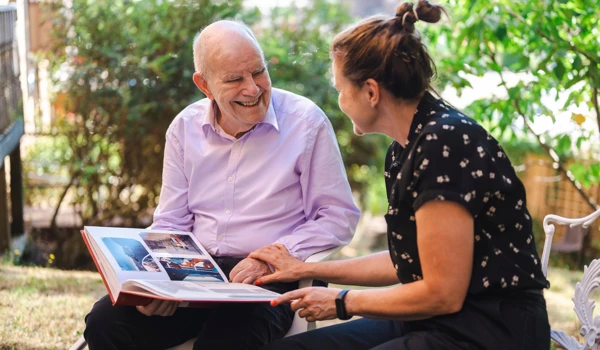Dementia is a complex and challenging condition that affects more than 55 million people worldwide, with nearly 10 million new cases every year, according to statistics from the World Health Organisation.
According to the Alzheimer’s Research UK Dementia Statistics Hub, dementia is a significant public health issue in the UK and is poised to become the most financially burdensome health condition by 2050. In 2021, the estimated expenditure on dementia in the UK was £25 billion, and this figure is projected to nearly double, reaching £47 billion by 2050.
Dementia causes cognitive decline which has an impact on various aspects of daily life for someone living with dementia. As we strive to improve the quality of life for people living with dementia, one crucial aspect stands out: maintaining a sense of independence. While the progression of dementia can make independence more difficult, it is important to recognise and support autonomy.
Preserving identity and dignity
Alzheimer’s Society says that people with dementia often feel happier if they remain independent and in their own homes as long as possible. Independence is closely tied to a person's identity and sense of self. For people living with dementia, maintaining a level of independence can contribute to a sense of purpose and dignity. Engaging in familiar tasks, making decisions, and having control over daily activities can help individuals feel more alert, stimulated, and connected to their past and present day.
When individuals are able to carry out tasks on their own, such as dressing, grooming, or preparing a simple meal, they experience a boost in self-esteem. This sense of accomplishment goes a long way in counteracting the feelings of frustration and confusion that often accompany dementia. By enabling independence, we empower these individuals to hold onto their self-worth and maintain a positive self-image.
Enhancing quality of life
The ability to engage in meaningful activities has a profound impact on the overall quality of life for people with dementia. While the disease may limit cognitive functions, allowing individuals to pursue activities they enjoy or have always found fulfilling, can bring joy and satisfaction. Whether it's gardening, painting, listening to music, or simply taking a leisurely walk, these activities contribute to emotional well-being and a sense of normalcy.
Independence also supports social interactions. When individuals can make decisions about their daily routines or engage in conversations, they are more likely to participate in social activities. This interaction is vital for emotional and cognitive stimulation, helping to slow down the progression of cognitive decline. Researchers found that just one hour of social interaction per week can help to reduce agitation levels and improve the quality of life for someone living with dementia.

The importance of staying active with dementia
Following a dementia diagnosis, individuals may experience heightened concerns about the future and a decrease in their self-assurance, which may lead them to withdraw from activities they typically enjoy. Maintaining an active lifestyle can significantly enhance the wellbeing of those living with dementia, by creating a sense of belonging within a community, making connections with others.
Engaging in regular activities can have several positive effects for individuals with dementia, including:
- Cultivating a more optimistic outlook and reducing feelings of anxiety or depression.
- Boosting self-esteem and bolstering self-confidence.
- Preserving physical, mental, and social skills.
- Providing an outlet for expressing emotions and creating connections with others, including the sharing of experiences with other people affected by dementia.
Reducing caregiver stress
The importance of independence in dementia isn't limited to the individual diagnosed with the condition. Caregivers, who play a crucial role in the lives of those with dementia, can experience immense stress and burnout. According to Alzheimer’s Research UK’s Dementia Statistics Hub, 1.1 billion hours are spent on unpaid care for people living with dementia and £10.2 billion is the total cost of informal care for dementia in the UK.
Encouraging independence can alleviate some of this responsibility. When individuals are able to handle certain tasks themselves, caregivers can focus on providing support where it's needed most. This can create a more balanced caregiver-patient dynamic, reducing feelings of frustration and dependency on both sides.
Promoting independence
Promoting independence in people living with dementia requires a tailored approach that considers their unique needs and abilities. Here are a few strategies to consider:
- Task simplification: Break down complex tasks into smaller, manageable steps. This approach allows individuals to complete tasks with less confusion and frustration.
- Supportive environment: Modify the living space to accommodate their abilities. Label drawers, create visual cues, and ensure the environment is safe and familiar.
- Structured routine: Establishing a routine provides a sense of predictability and can help individuals retain a sense of control over their day-to-day activities.
- Encouragement and patience: Positive reinforcement and patience go a long way. Celebrate small achievements and help when needed without taking over completely.
- Adaptive tools: Use adaptive tools to assist with tasks. These can include utensils with larger grips, memory aids, and technology that assists with medication reminders.
Tools to help support people living with dementia
There are several tools and approaches that can be used to support individuals with dementia in various aspects of their daily lives. These tools are designed to enhance their independence, communication, and overall wellbeing. Here are some examples:
- Memory aids: Memory aids can include tools like calendars, clocks, and whiteboards that help individuals keep track of appointments, important dates, and daily routines. Digital devices with reminder features can also be useful for medication schedules and daily tasks.
- Communication aids: Communication can become challenging for individuals with dementia. Picture-based communication boards or apps can help with communication by allowing them to point to images representing their needs or preferences.
- GPS tracking devices: For those who are at risk of wandering or getting lost, wearable GPS tracking devices can provide peace of mind to caregivers and ensure the individual's safety.
- Medication management apps: These apps can help individuals and caregivers keep track of medication schedules, set reminders for doses, and manage prescription information.
- Cognitive stimulation apps and games: There are various apps and digital games designed to provide cognitive stimulation and engage memory, attention, and problem-solving skills.
- Voice-activated assistants: Devices like smart speakers with voice-activated assistants can help individuals control their environment, play music, set reminders, and even answer simple questions using voice commands.
- Adaptive eating utensils: Individuals with motor difficulties may benefit from adaptive utensils with larger handles, curved shapes, or specialised designs that make eating and drinking easier.
- Sensory stimulation tools: Items like sensory blankets, textured objects, and aromatherapy kits can provide comfort and sensory stimulation, potentially reducing anxiety and agitation.
- Music therapy: Music has been shown to have a positive impact on individuals with dementia. Personalised playlists or music therapy sessions can help improve mood, reduce stress, and evoke memories.
- Life story books: Creating life story books with photos and mementos can help individuals connect with their past and remember important life events. This can be a valuable tool for family members, caregivers, and healthcare professionals to understand the individual's history.
- Structured activities and games: Engaging in familiar activities like puzzles, crafting, or gardening can provide a sense of purpose and enjoyment. Structured activities with clear instructions and materials can be particularly beneficial.
- Virtual Reality (VR): Virtual reality experiences can transport individuals to different places and times, providing sensory stimulation and cognitive engagement.
It's important to note that the effectiveness of these tools can vary based on the individual's preferences, cognitive abilities, and stage of dementia. Caregivers, family members, and healthcare professionals should work together to select and implement the tools that best suit the individual's needs and preferences. Additionally, regular assessments and adjustments should be made to ensure that the tools continue to provide meaningful support.
Supporting people living with advanced stages of dementia
For individuals in advanced stages of dementia, specialist dementia care is crucial. In these stages where cognitive and physical challenges may be profound, getting specialised and professional care is important.
Dementia care homes have teams of skilled staff who understand the intricacies of dementia, can provide safety measures, and offer stimulating activities that have been tailored to residents’ needs. Staff will also manage medication and behavioural symptoms, and ensure residents get the right nutrition, all whilst striving to allow residents to maintain a sense of independence. Families and care givers should work together with healthcare professionals to determine when specialist care is necessary, to ensure the person living with dementia receives the support they need for their physical and mental wellbeing.
In advanced stages of dementia, the significance of preserving a level of independence is of utmost importance. Even though cognitive and physical abilities might be severely impaired, promoting independence is important for the person living with dementia’s dignity and overall wellbeing. Specialist dementia care homes recognise the importance of will incorporate strategies to support independence alongside the necessary care.
Promoting independence can positively influence overall quality of life, as it can help to reduce feelings of frustrations and agitation that can often accompany the disease, which will help to enhance emotional wellbeing. By offering opportunities for choice and autonomy, it can help individuals feel more in control of their surroundings and routine. Simple tasks like choosing a preferred snack or choosing an activity to engage with can make a significant difference in the person’s overall quality of life.
In the journey of living with dementia, maintaining independence is significant. By ensuring autonomy, we respect the identities of those living with dementia, enhance their quality of life, and ease the burden on caregivers. Through thoughtful strategies and support, individuals with dementia can continue to lead meaningful lives while maintaining a sense of control and dignity.
Next steps

Find Dementia Friendly Care Homes
Are you searching for a suitable dementia friendly care home in your area? Our homes provide high quality support, delivering the same exceptional care you'll find our other facilities whilst offering specialist support for loved ones living with dementia.

Helpful organisations for those living with dementia
Find a list of helpful organisations for those living with dementia.

Talking to loved ones with dementia
Understanding and communicating with loved ones living with dementia is important. With 850,000 people living with dementia in the UK, talking to loved ones sensitively is important. Here we look at some of the ways to have positive communication with loved ones living with dementia.
